
What to Do If You Are the Victim of Social Media Defamation
This page has been peer-reviewed, fact-checked, and edited by qualified attorneys to ensure substantive accuracy and coverage.
Social media defamation is an all-encompassing term used to describe a false statement of fact about a third party published to a social media website, platform, or app, such as Facebook, Twitter, or Instagram.
Social media defamation is often referred to as ‘social media slander’ or ‘slander on social media.’ However, these terms are technically misnomers; since social media defamation involves the written (or in this case, “posted”) word, it is considered libel.
At Minc Law, we have proven success in removing defamatory posts, profiles, and content from popular social media and professional networking websites. We also have extensive experience stopping harassment on social media and holding perpetrators accountable for their actions. We pride ourselves on achieving results as quickly and efficiently as possible, without drawing unwanted attention to these sensitive situations.
In this article, we will discuss the definition of social media defamation and its potential impacts. We will also show you the most common ways people are defamed on social media, and how you can protect yourself from this type of defamation. Finally, we will list the steps to take if you are already the victim of social media defamation.
What is Social Media Defamation?
Defamation is a false statement made to a third party that causes damage to the reputation of another person. Defamation can be broken up into two types: slander and libel.
- Slander is a false statement made through spoken communication (for example, giving a defamatory speech);
- Libel is a written or published false statement (for example, an online review or social media post).
Social media defamation is a term used to describe content that is published to a social media platform that defames a person or business. This type of defamation is also commonly referred to as libel, cyber defamation, disparagement, character assassination, cyberbullying, and cyber harassment.
The most common social media platforms where defamation can occur include:
Impact of Social Media Defamation on Individuals & Businesses
In the 21st century, the internet has become an increasingly prevalent part of everyday life—and social media is no exception.
As of 2020, studies show that there are over 3.6 billion people using social media worldwide, which is a 12.3% increase in usage from the previous year. The average person spent two hours and 24 minutes per day using social media in 2020, which was a 38% increase over the past five years.
With social media becoming so instrumental to how we interact with one another in the modern era, it makes sense that the attempt to harm an individual’s (or business’s) reputation on social media can have very real and far-reaching effects.
Most individuals use social media platforms to stay in touch with friends and family, make new friends, find romantic partners, and connect with public figures (such as celebrities, athletes, and politicians). And most businesses create social media platforms to improve brand awareness and network with potential customers.
However, there are some bad actors who use their social media accounts to harass and defame others online.
The ability to create anonymous profiles allows such individuals to post defamatory content with the assumption that they are untraceable. This assumption leads many social media users to be bold and post without a filter.
Due to the prevalence of social media, these kinds of harmful and false statements are being published every day. Some of these untrue statements are considered defamatory, which can end in negative consequences for both the victim and the poster.
What Can Happen if You Don’t Take Social Media Defamation Seriously?
There are many possibly life-changing consequences of not taking social media defamation seriously. Below, we list some of those consequences for both those on the receiving end of defamation and those publishing the defamatory statements.
If defamatory statements are being made about you or your business, these statements could cause you to experience:
- Harm to your reputation. Your colleagues, friends, and family may see or hear about the defamatory statements, and if they believe what is being said, your reputation and relationships could suffer.
- Loss of business and/or profits. If defamatory statements are made about your business in the form of false online reviews (such as a fabricated one-star review), potential customers may believe the malicious lies and avoid doing business with you.
- Psychological damage. The negative effects on your reputation, relationships, and professional life could also affect your mental health. Many victims of defamation suffer from extreme stress, anxiety, and depression due to the upheaval defamation causes to their lives.
If you are the one who is attempting to shame someone online by publishing defamatory statements, you may be facing consequences such as:
- Civil liability or lawsuits. Since the potential harm caused to the victim by public shaming on social media is very real, do not be surprised if they bring legal action against you. Defamation suits are not only for businesses and public figures; they can affect everyday individuals as well.
- Possible criminal charges. Depending on the circumstances of the online shaming, you may be charged with cyberbullying and/or other violations of criminal statutes in your state. Currently, 13 U.S. states have criminal defamation laws codified in their books that are still enforced, with criminal consequences ranging from fines to jail sentences.
- Guilt or mental anguish. If you post a defamatory statement in the heat of the moment, you may not have thought through the consequences of your actions. After seeing the harm caused to your victim’s reputation and personal life, you will likely feel regret and guilt over your actions.
Impact of Social Media on Modern Day Defamation Laws & Free Speech
In recent times, social media sites like Facebook, Twitter, and Instagram have become platforms on which users feel they should be allowed to exercise their right to free speech. Some argue that when social media platforms ban or restrict users, they are infringing on this constitutional freedom.
Others argue the opposite—that the platforms do not do enough to prevent cyberbullying, defamation, and online harassment.
The truth is that the First Amendment of the U.S. Constitution protects Americans’ right to freedom of speech from government censorship. Since social media platforms are private entities, they are legally able to censor what their users post.
While the First Amendment protects freedom of speech, it still allows individuals who publish those false statements to be sued for defamation.
In short, freedom of speech does not give anyone—not even social media users—the right to say or publish whatever they want without repercussions.
Minc Law Tip: Those who commit defamation are at risk of many negative repercussions if the public shaming goes viral or backfires. By trying to draw negative consequences down on others, you may become the target for shaming yourself—just ask #PermitPatty, who became a target for internet mockery and derision after calling the police on an 8-year-old African American girl for selling lemonade at a public park.
Examples of Social Media Defamation
Some of the most common ways in which someone can be defamed on social media include:
- A post published on an individual’s Facebook profile,
- A post published in a Facebook group,
- A tweet published on an individual’s Twitter profile,
- Fake reviews on Facebook business pages,
- Comments on a post, video, or tweet,
- A video on Tiktok,
- A photo and/or caption on Instagram, or
- A video posted to Youtube.
Below, we have laid out two fictitious examples of such behavior in greater detail.
Example 1 – Facebook Defamation
You own a popular ice cream shop and recently discovered that a customer posted a disparaging post on Facebook about your business. This post includes a fabricated photo of a bug in their ice cream cone, along with a statement about how your business never passes health inspections.
This Facebook defamation could potentially harm your business. Those who see the post may be influenced not to patronize your business, which could result in a loss of money for you.
You know that the photo is fake—and you have proof that you do, in fact, pass all health and safety inspections. As the business owner, you could file a defamation suit against the customer who created this post.
Example 2 – Twitter Defamation
You recently left a job and are on the hunt for a new opportunity. A former coworker of yours has recently engaged in Twitter defamation by posting a series of tweets about your lack of ability to do your job.
These statements are false and have no truth to them whatsoever. In fact, you have a glowing reference letter from your former supervisor about your job performance.
This activity would be considered defamation because your former co-worker is defaming your character and potentially harming your ability to seek other employment.
Minc Law Social Media Defamation Tip: If you have been the victim of defamatory activity on Twitter, we recommend that you report the tweet(s) as soon as possible. For more information on how to report this kind of harmful behavior, see our article “How to Report a Tweet & Twitter Account.”
Four Popular Social Media Defamation Cases
Below, we have compiled four real-life examples that demonstrate how social media defamation can trigger legal cases.
Social Media Defamation Example 1 – Elon Musk & the Cave Diver
In 2018, Tesla Founder’s Elon Musk tweeted about British cave diver and expert, Vernon Unsworth. Mr. Unsworth is credited with helping to rescue 12 Thai teenagers from a flooded cave during the summer of 2018. He is widely considered a cave diving expert and was credited for assisting in the life-saving efforts of the boys.
In Musk’s tweets, he vaguely referred to Unsworth as a “pedo guy.” Unsworth filed a lawsuit in California for defamation/libel based against Elon Musk based on the tweets made from Musk’s account.
In the end, the jury found that the statements Musk made did not meet the legal standard for defamation. Musk was not held liable for damages because the jury felt that “…people that read Musk’s tweet wouldn’t have known who he was talking about.”
Social Media Defamation Example 2 – Parent Publishes Defamatory Remarks Against School Superintendent
A woman named Susan McNair was sued for $75,000 after she made a false and defamatory statement on Facebook about Marlow School District Superintendent George E. Coffman. In her posts, she accused him of “misappropriating federal funds.”
Mr. Coffman claimed in his suit that McNair’s comments on Facebook were made “to embarrass, harass and annoy [Coffman] for the purpose of causing [Coffman] to resign his position as Superintendent.”
The suit was ultimately withdrawn by Coffman a little over a month after it was filed.
Social Media Defamation Example 3 – Industry Rival Accuses a Mother of Causing the Death of Her Son
In a heated Facebook exchange, Jaqueline Hammond implied that a previous business rival, Davyne Dial, had gotten drunk and caused the death of her own child. Dial’s adolescent son had passed away in a tragic accident almost forty years previously.
Dial used screenshots of the Facebook exchange to bring a lawsuit for defamation, intentional infliction of emotional distress, and negligent infliction of emotional distress. The lawsuit resulted in a $500,000 settlement for Dial, which is an unusually high amount for a private defamation lawsuit.
Social Media Defamation Example 4 – Business Owner Defamed by Members of a Primate Enthusiast Facebook Group
Margaret Hosseini owned a tax preparation business and promoted her company on social media. She was also a primate trainer and enthusiast and belonged to several online communities for people who shared her interests.
After coming across a Facebook page promoting animal abuse, Hosseini reported the page and had it removed. The page owners began posting threats and defamatory statements to Hosseini’s personal and business Facebook pages in retaliation.
Hosseini sued these individuals for defamation of a company and presented evidence that the threats and false statements had caused her both significant mental anguish and loss of business. After a lengthy court proceeding, Hosseini won the defamation case on appeal and was granted $315,000 in damages.
How to Protect Yourself From Social Media Defamation
Social media defamation can destroy people’s lives and cause businesses to ultimately close their doors. Protecting yourself from social media attacks and defamation may seem like a daunting task, but we have compiled a list of how you can protect yourself or your business from social media defamation:
- Adjust your social media privacy settings;
- Report, flag, and request removal of defamatory content;
- Sign up for a Digital Risk Protection service.
Video: What to Do If You Are The Target of Social Media Defamation

Adjust Social Media Privacy Settings
To protect yourself from potential social media defamation, it is a good idea to take a look at your social media privacy settings and re-evaluate your needs. The more private your profiles are, the harder it is for individuals with bad intentions to find you and your content.
Video: How to Protect Your Privacy on Social Media

Here at Minc Law, we see countless cases in which a client’s public social media profile renders their content vulnerable to being reposted with harmful intent.
For example, say you have a public Twitter account and you decide to post a meme that may be considered offensive to others. You realize your mistake and delete the tweet. No harm done, right?
Not necessarily. Since this tweet is visible to anyone in the world, someone you do not know decides to take a screenshot of your post before you delete it. Then, they create a new tweet defaming and harassing you using that screenshot. The tweet goes viral, and soon you are being harassed by the public.
If your Twitter had been set to private, you may have been able to avoid this defamation issue.
Nothing on the internet is private, but by changing your social media settings and remaining mindful about what you are sharing, you can help protect your reputation and avoid social media defamation.
How to Adjust Your Twitter Privacy Settings
To set your Twitter account to private, navigate to your Twitter profile. On the left side of the screen, click the “More” option (it may be an icon with three dots).
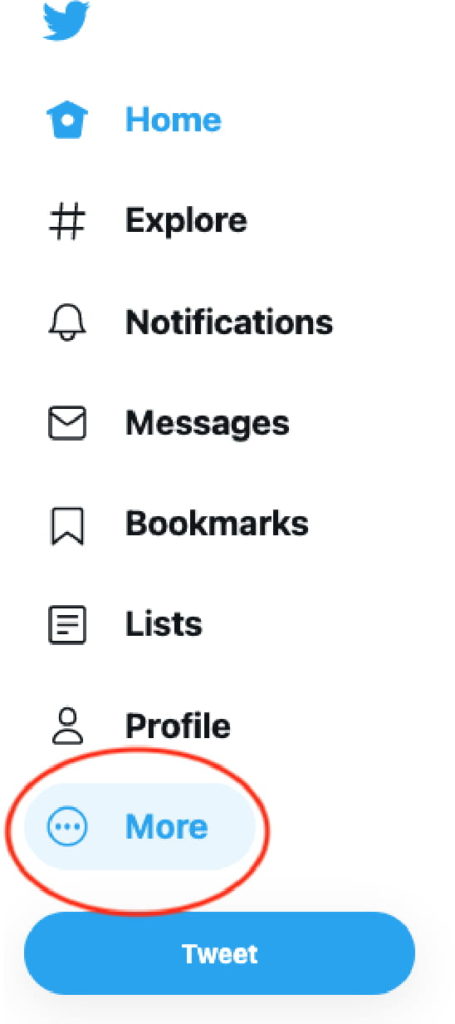
Select “Settings and Privacy.”

On the Settings page, click “Privacy and Safety” to bring up a menu of privacy settings options.
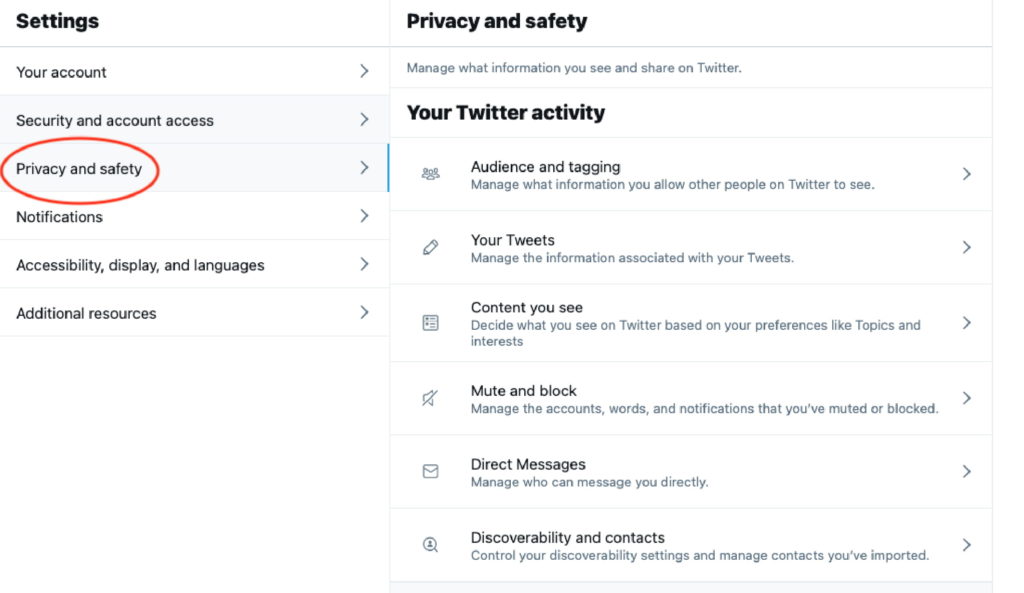
From here, you can tailor your Twitter privacy to your preferences. You may want to manage the information other Twitter users can see, choose how and when you can be tagged, or manage your profile’s discoverability on Twitter.
How to Adjust Your Facebook Privacy Settings
To ensure your Facebook profile is set to private, open the platform on your computer. Click the down arrow in the top right corner to bring up a navigation menu. Click “Settings & Privacy.”
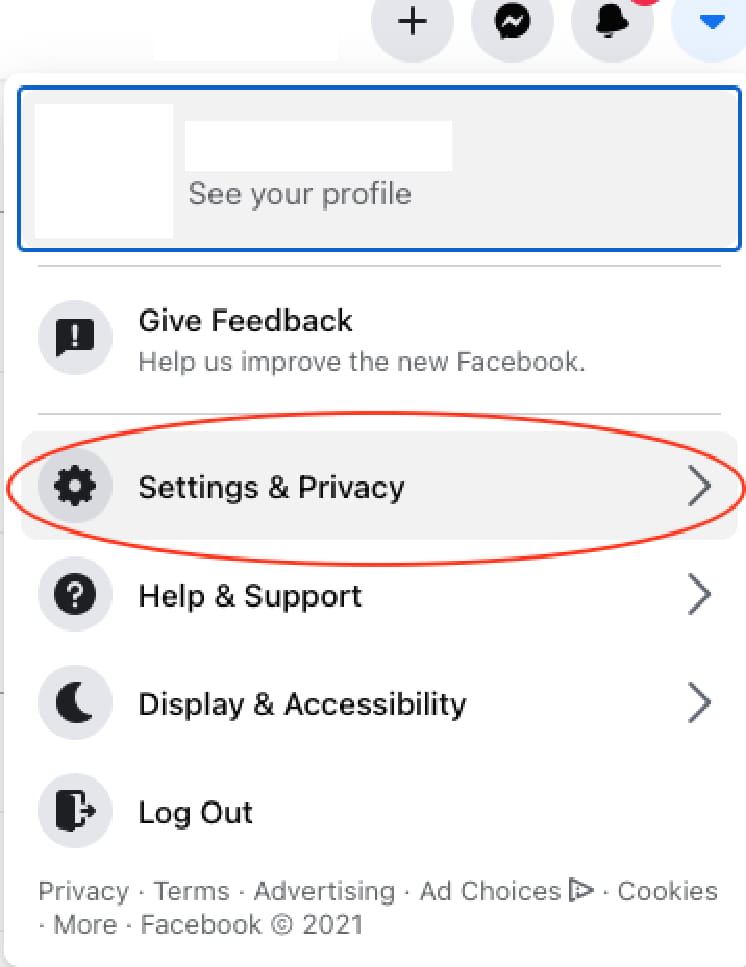
Then, click “Settings.”
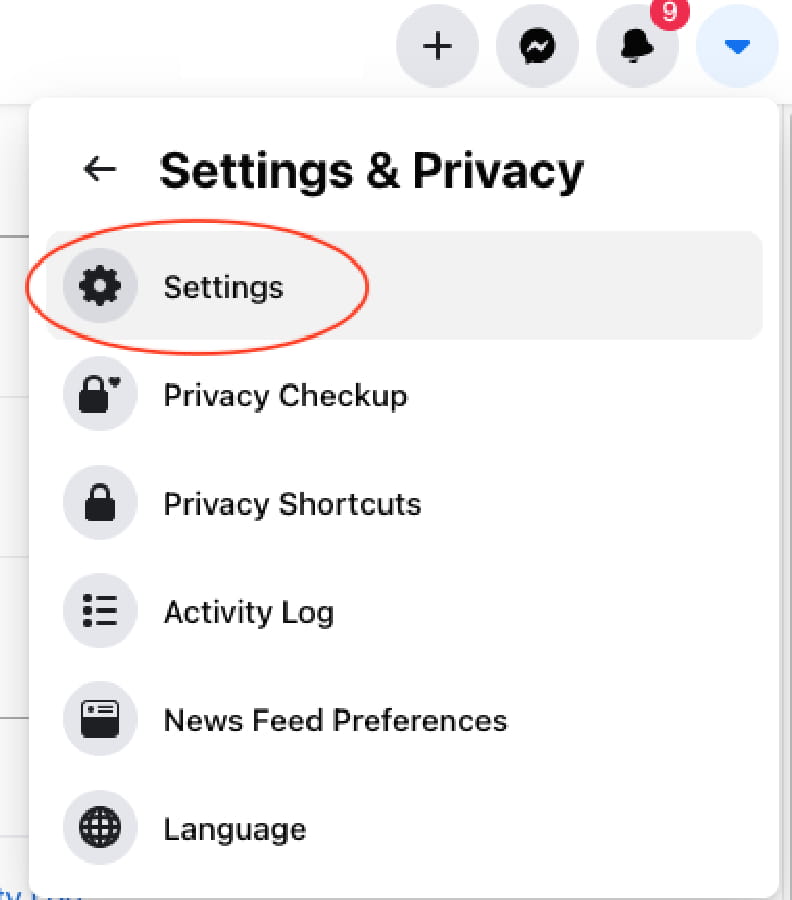
On the main Settings page, you can toggle to “Privacy” on the left-hand side, which will show you your current privacy settings.
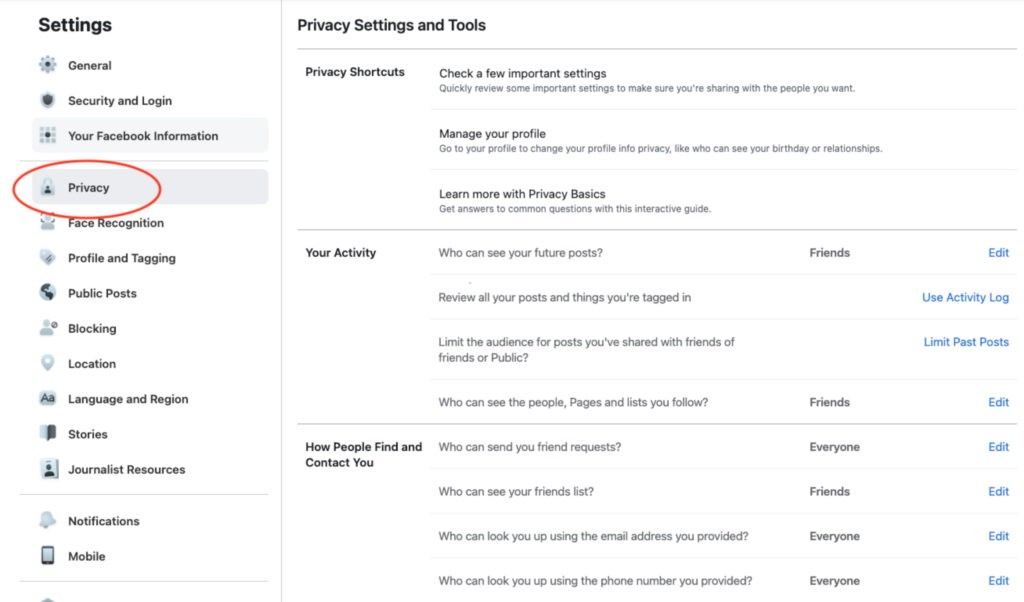
On this page, you can select who you would like to be able to see your posts, limit the audience for your shared posts, and choose whether search engines can link to your Facebook profile, among other options.
Report, Flag, & Request Removal of Defamatory Content
In some cases, you may be able to report, flag, or request the removal of unwanted or defamatory content on social media. Most platforms such as Twitter and Facebook provide a way for you to report or flag content that violates their terms of service or standards, such as:
- Nudity,
- Violent content,
- Racist remarks, or
- Bullying statements.
When you do report offensive or defamatory content to a social media platform, be prepared to explain why it is defamatory or why the content violates the platform’s rules.
Ultimately, it is up to the online platform to decide to remove the content. Most often, unless it is a clear violation of their terms of service, the platform will not take action. Social media platforms do not want to be the judge and jury deciding what constitutes defamation and what does not. They would prefer to leave that decision up to the courts.
But if you are the victim of social media defamation, it is still worth a try to bring the defamatory content to their attention.
To report a tweet on Twitter, click the three dots on the upper right corner of the tweet. Click “Report Tweet.”
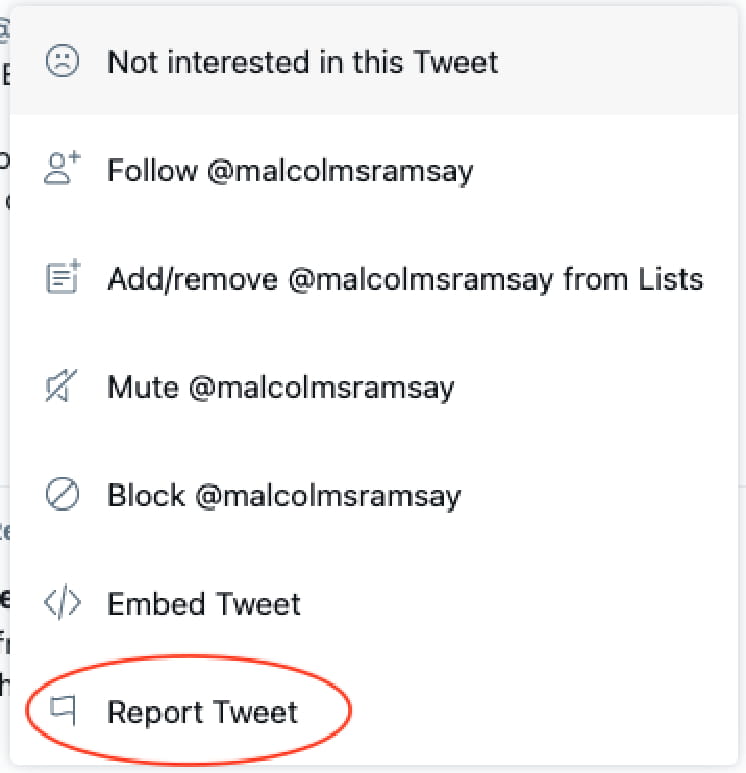
Select from the menu of reasons to report, then follow the prompts to input all relevant information about why the tweet is abusive or inappropriate.
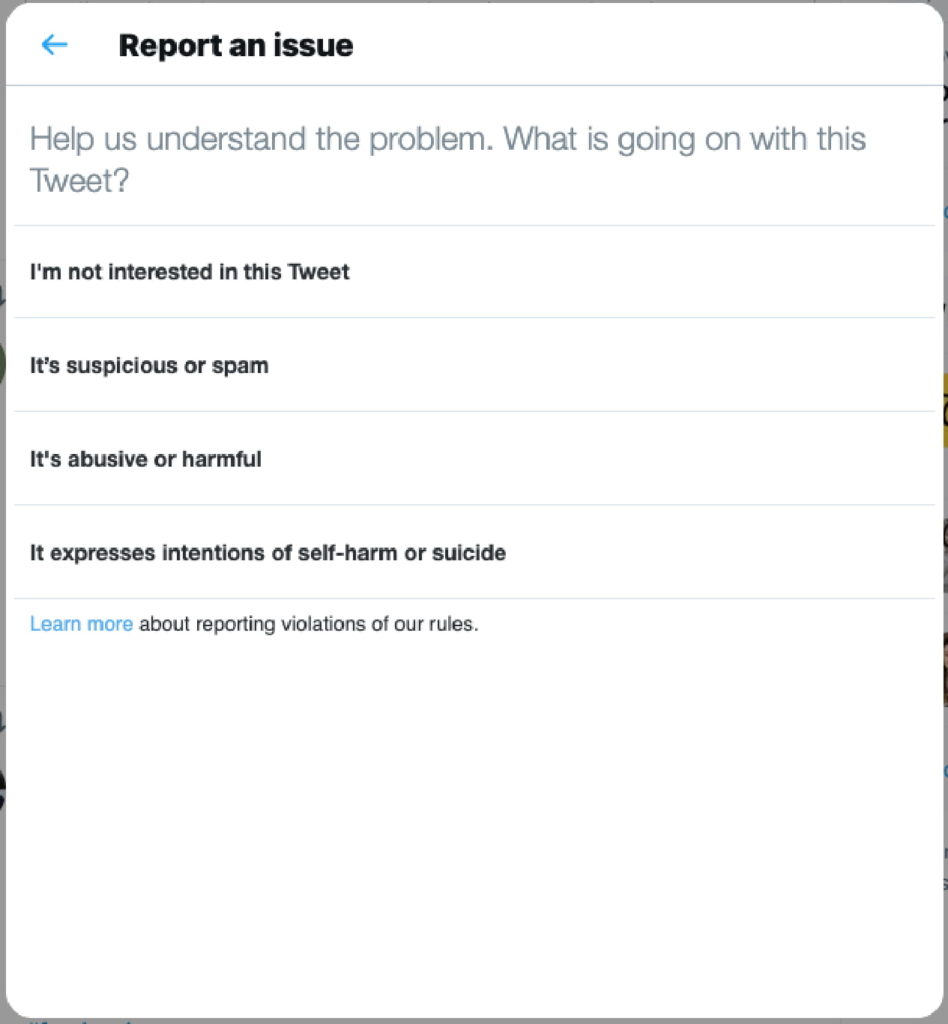
To report a post on Facebook, click on the three dots on the upper right corner of the post. Click “Find support or report post.”
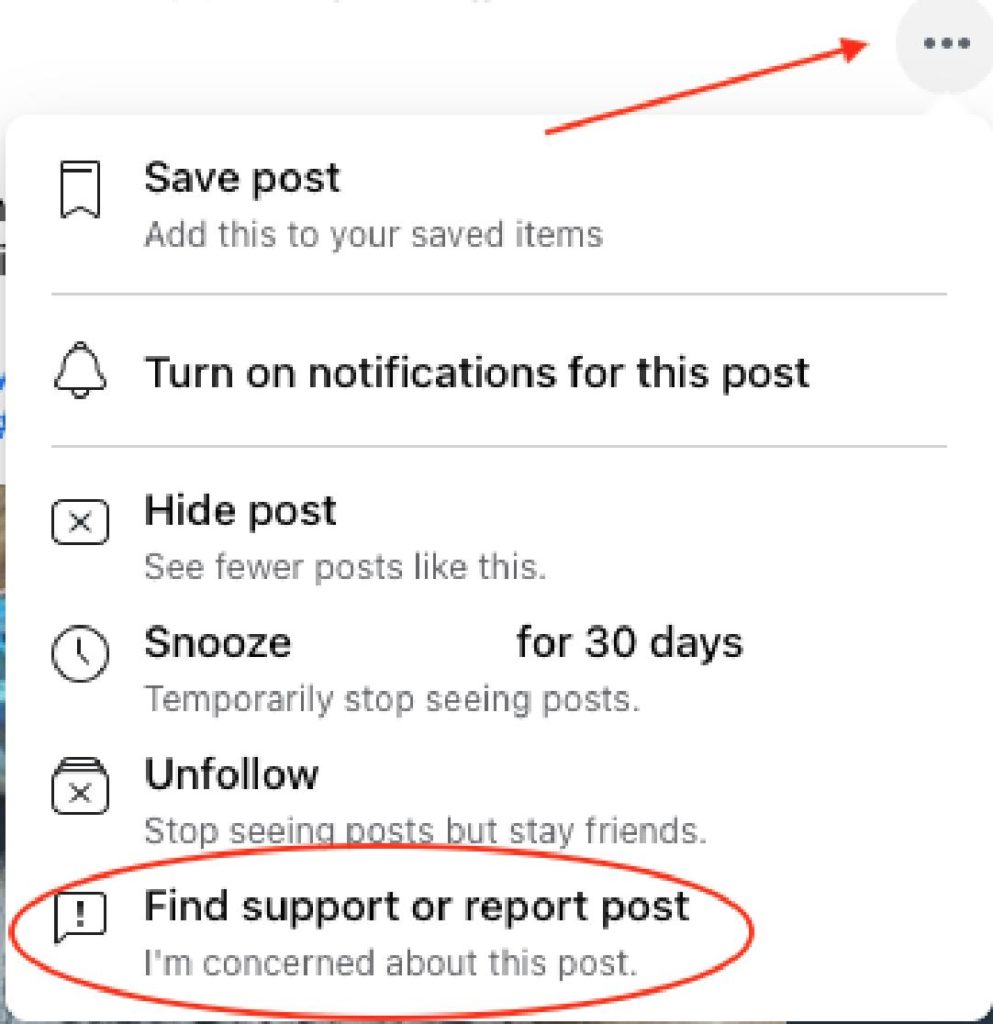
On the next page, click the reason you are reporting the post. Follow the prompts to inform Facebook administrators of any relevant information.
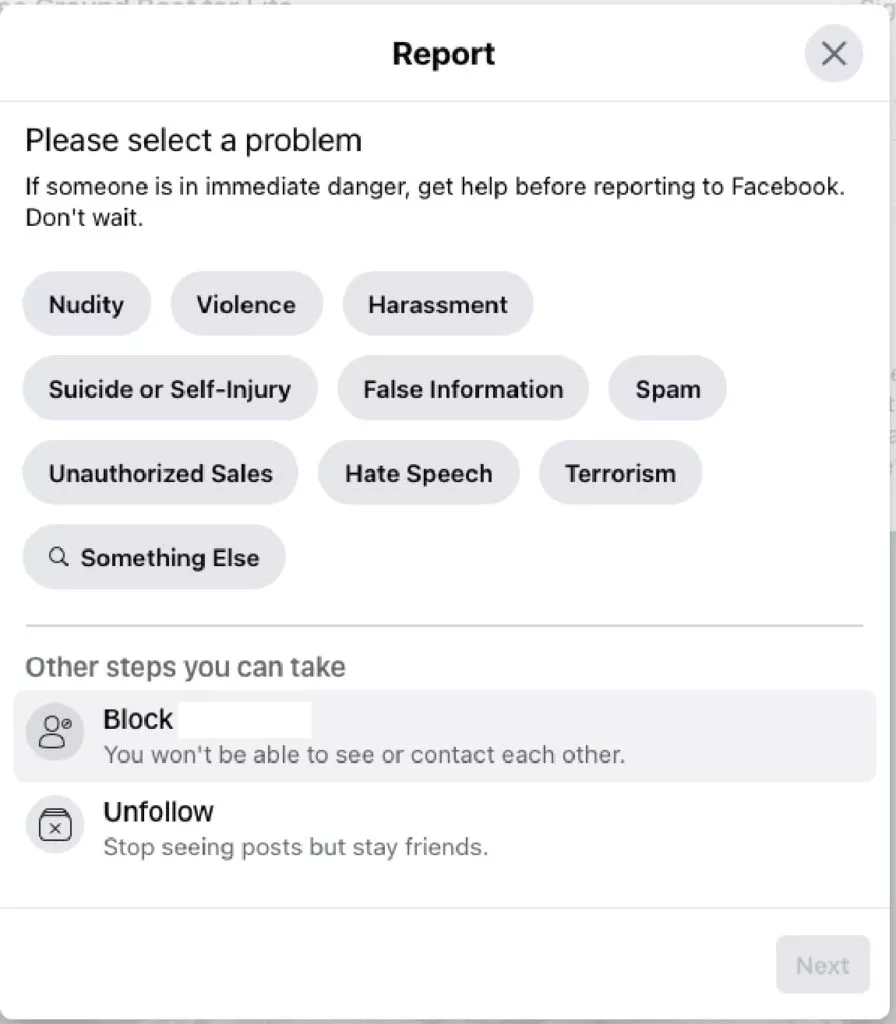
If reporting or flagging the content does not work, we recommend consulting with a defamation attorney who can help you take the next steps in attempting removal.
Sign up for a Digital Risk Protection Service
As our lives become more digitized, there is an increase in online threats, including defamation. A digital risk protection service is like a home security system for your online reputation; it can monitor and identify threats to your reputation online.
Some protection services can monitor social media platforms and alert you to threats such as impersonating accounts or defamatory posts.
If you want to protect yourself from social media defamation, this type of service may be a good fit for you. You may want to consider a digital risk protection service for yourself or your business if you:
- Have a visible internet presence,
- Are aware of possible online risks to your digital assets,
- Have been previously defamed or threatened on the internet, or
- Want to protect yourself from future attacks.
For more information on Digital Risk Protection, see our article titled Frequently Asked Questions About Digital Risk Protection (DRP).
Minc Law Online Reputation Management Tip: We recommend signing up for a free Google Alerts account to monitor your online reputation. Google Alerts will not prevent online defamation, but it will notify you of any mentions of your name or business online. With this tool, you will be able to respond quickly to any negative content or defamation that you see.
Steps You Can Take If You Are a Victim of Social Media Defamation
Being a victim of social media defamation is stressful and embarrassing. When you have been the victim of social media defamation, it is important to take certain actions and avoid others. We recommend the following course of action to stop online defamation, restore your reputation, and fight back:
- Do NOT respond to the defamer;
- Do NOT take extreme action;
- Preserve and save the content;
- Send evidence preservation letters;
- Block the user;
- Contact an internet defamation attorney.
Do NOT Respond to the Defamer
If you are being defamed on social media, your first reaction may be to retaliate against your attacker. We recommend stepping back and taking a deep breath.
Rebuttals can often trigger more criticism and draw attention to you and the post, resulting in a social phenomenon known as the Streisand Effect. Responding to an attack can worsen a situation and open you up to legal liability if you start publishing false statements against your attacker as well.
We suggest consulting with a defamation lawyer before responding to the perpetrator.
Do NOT Take Extreme Action
While social media defamation is humiliating and embarrassing, it is not the end of the world. We understand how difficult online defamation can be, but there are solutions to this problem.
We cannot stress this enough: you do not need to take extreme action, such as hurting yourself or others, over social media defamation. There are less extreme (and more effective) remedies available—and nothing on the internet is worth causing harm to yourself or another person.
If you are experiencing suicidal thoughts, please call the National Suicide Prevention Lifeline at 800–273–8255 to talk to someone who can help.
Preserve & Save the Content
If you want to file a defamation lawsuit over social media libel, you will need evidence. Ensure you save or copy the defamatory statements by taking screenshots or using a preservation tool like Page Vault to capture the post, photo, or video.
A defamatory statement or post could be removed at any time, either by the author or the platform—so saving a copy is extremely important. Without evidence of the defamation, you do not have a case.
Send Evidence Preservation Letters
If you are the victim of anonymous defamation, you should ask the hosting platform or website and the internet service provider to preserve all information about the accounts in question.
If you are planning to file a lawsuit and subpoena the website and/or internet service provider, it is imperative to ask that they preserve this data so it is still available when you do issue that subpoena. Otherwise, the data could be deleted in their regular course of business.
For further reading on how to deal with anonymous defamation, make sure to read attorney Brinton Resto’s comprehensive article ‘How to Identify Anonymous Online Posters’.
Block the User
After you have preserved the defamatory material and any other pertinent information, you may want to consider blocking or removing the social media user who is defaming you.
Blocking them from seeing or interacting with your profile can cut down on your mental distress. And since blocking a user on social media stops you from seeing what they are publishing as well, this action can bring you added peace of mind.
Contact an Internet Defamation Attorney
Finally, reach out to an experienced internet defamation attorney to discuss your case. An attorney can walk you through your options and explain whether or not you have a defamation claim to pursue.
Can You Sue Someone for Defamation on Social Media?
Yes, you can sue for social media defamation. However, while it may seem natural to want to sue the social media platform for defamation, your best option is to file a defamation lawsuit against the individual poster or commenter.
Social media platforms are granted near blanket-immunity under the landmark piece of internet legislation known as ‘Section 230 of the Communications Decency Act‘, and generally cannot be sued unless a key exception applies. We go over why this is in greater detail in the video below.
Video: What is Section 230 of the Communications Decency Act?

To prove your defamation case in most jurisdictions, you will need to demonstrate that the statement in question was false and:
- Communicated or published about you;
- Communicated to a third party;
- Made with an intent to harm; and
- Caused damage to you.
How Can You Take Down Negative Posts & Comments That Are Not True?
Some may say that once something is posted to the internet, it is impossible to remove—but that is not necessarily true.
There are many ways to remove content from the internet. Here at Minc Law, we find that these methods are the best way to have negative social media posts and comments taken down:
Ask the Original Author to Remove the Post
One common way of removing a negative post or comment is to convince the original author to remove it. If someone publishes content, they can usually take it down easily.
Flag or Report the Content to the Platform
To flag or report the content in question, you need to identify what guidelines or rules have been broken. Then, report it to the platform hosting the defamatory or negative content.
See the instructions above for more information on how to report content to Twitter and Facebook.
Pursue Legal Action Against the Person Who Posted the Content
If all else fails, you can pursue legal action against the author of the post and potentially obtain a court order to remove content. Pursuing litigation is a serious and expensive decision that should only be sought after you have exhausted all other options.
Frequently Asked Questions (FAQs) About Social Media Defamation
Can You Sue Someone for Talking Bad About You on the Internet?
Yes, you can sue someone for talking bad about you on the internet if the statement crosses into the territory of defamation. Defamation includes both written (libel) and spoken (slander) statements.
To succeed in a lawsuit, the plaintiff must prove the statement’s falsity, publication to a third party, that it was unprivileged, and the statement resulted in harm to the reputation of the plaintiff.
When suing for talking bad about you on the internet, there are numerous challenges and hurdles the plaintiff may need to overcome, such as proving the falsity of the statement(s), potential defenses the defendant may rely on, and jurisdictional issues.
Is it Illegal to Slander Someone on Facebook?
Yes, it is illegal to slander someone on Facebook. Slander is the publication of false spoken statements, typically seen in Facebook livestreams or videos, that cause damage to another’s reputation.
Victims of slander on Facebook may take legal action, such as filing a defamation suit against the speaker, in cases where the statements were publicly shared and caused reputational damage to them.
Can You Sue for Defamation via a Video?
Yes, you can sue for defamation made via video. When defamatory statements are published in video form, this typically falls under the category of libel. However, statements made in livestreams or other videos may constitute slander.
To sue for defamation published via video, a victim must show that the statements prove that there was a false assertion of fact that was published to an audience and it causes harm to their reputation or financial status.
Can I Sue Facebook for Emotional Distress?
Generally, you cannot sue Facebook and other similar platforms for emotional distress. Facebook and user-generated content platforms are protected under Section 230 of the Communications Decency Act. Section 230 explicitly lays out protections for online platforms that host/publish user-generated content.
While you cannot typically sue Facebook for emotional distress, you may be able to sue the individual who posted the harmful content.
How to Respond to False Accusations on Social Media?
If you are falsely accused of something on social media, follow these steps:
- Ignore the accuser;
- Avoid drastic measures;
- Save the evidence;
- Send preservation letters,
- Block the user;
- Consult an internet defamation lawyer.
An attorney can help you navigate these false accusations and explore if you have a valid defamation claim.
Minc Law Can Help Fight Back Against Social Media Defamation
Social media has become an inseparable part of our lives, which means that the consequences of being shamed or defamed in those spaces are as real as in any other medium.
If you are the target of social media defamation, it can feel as if the whole world is against you. You may not know how to tackle the problem or where to turn for help.
Here at Minc Law, we are a single point of contact for everything regarding social media defamation and internet defamation. We have extensive experience removing defamatory content from social media websites, platforms, and apps, and holding individuals who publish this content accountable for their actions.
★★★★★
“Melanie was absolutely fantastic. Six years ago, someone wrote something terrible about me online and it followed me wherever I went! Jobs, relationships, etc. I finally got in touch with Minc, and Melanie was so courteous, professional, and diligent about getting the post removed. Thank God for Minc Law because I’m getting married next year, and I finally feel comfortable using my full name on my wedding announcements! Thank you, Minc!!!”
HCP, Sept 28, 2020
To learn more about how we can help you and to set up a free consultation with an intake specialist, fill out our online contact form, use our Live Chat feature, or call us at 216-373-7706.





